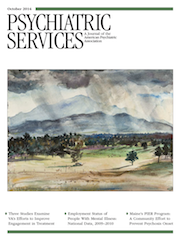Economic Grand Rounds: Treatment Participation and Medication Adherence: Effects on Criminal Justice Costs of Persons With Mental Illness
Abstract
Little empirical research has directly examined the extent to which early and consistent participation in outpatient services and adherence to prescribed psychotropic medications after a psychiatric hospitalization can help people with serious mental illnesses avoid arrest and incarceration and what impact this might have on state and local costs. The authors examined effects of medication adherence in the first 90 days after a psychiatric hospitalization among 1,367 adults with schizophrenia or bipolar disorder served by the public behavioral health systems of Miami-Dade County and Pinellas County in Florida. Better adherence was associated with lower subsequent criminal justice costs and greater use of treatment services. A modest investment in promoting treatment participation and medication adherence may reduce criminal justice involvement and costs for persons with serious mental illness.



